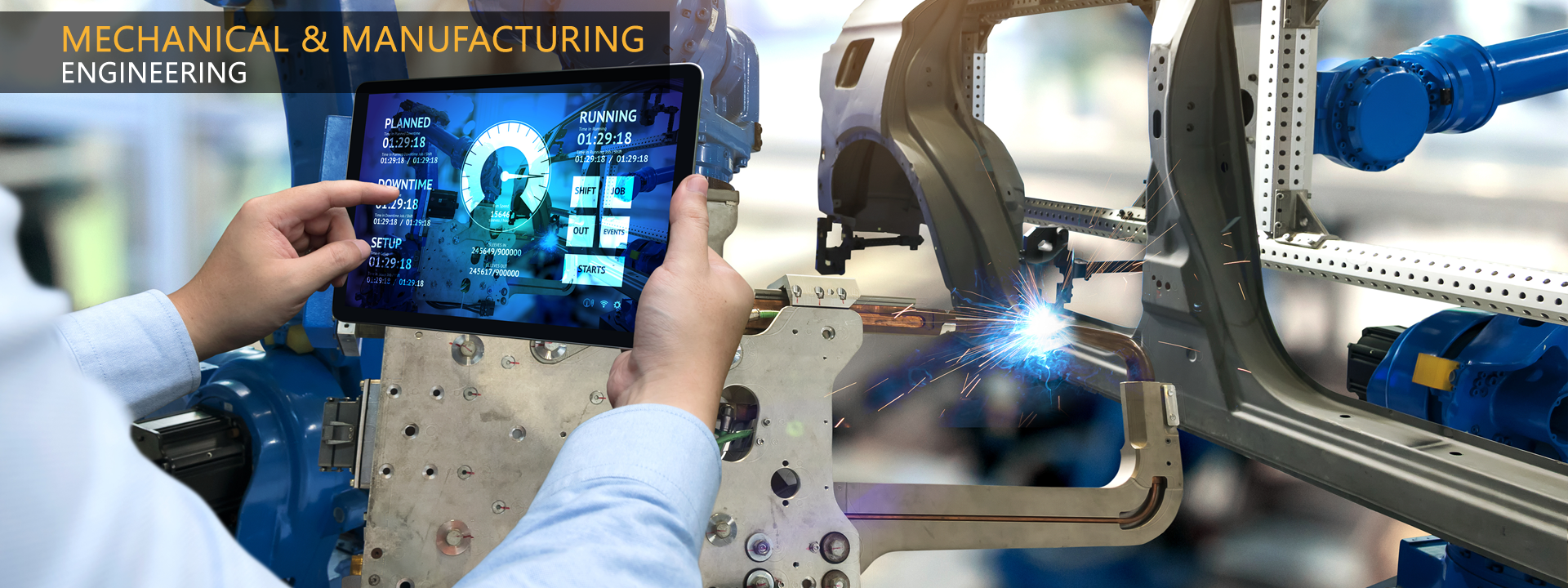Mechanical and Manufacturing Engineering
Want to Design Robots, NASA systems, and More?
Replacing Lost Fingers...Designing Medical Devices...Designing Robots & Biofuel Processes...Create Systems for NASA's Space Program
Welcome to the Department of Mechanical and Manufacturing Engineering at Tennessee State University. Our undergraduate and graduate programs are among the finest. We have strong teaching and research programs in mechanical and manufacturing engineering areas. We also have a strong collaborative research program that works directly with industry and government agencies to provide the latest research developments that are both state-of-the-art and applied. Most importantly, our undergraduate and graduate programs have full accreditation: they’ve been approved by the professional bodies. Tennessee State University’s Main Campus is located five minutes west of downtown Nashville at 3500 John A. Merritt Blvd., Nashville, TN 37209. The department is very proud of the high quality students that it produces and makes a special effort to provide a friendly and supportive environment. You will be given every opportunity to reach your full potential when you study your degree here. We are seeking committed top-quality undergraduate and graduate students who are interested in obtaining a degree in this exciting field of study. We are also seeking industrial partners who want to hire some of the best engineers in the country and to have access to the latest research developments in the mechanical design, dynamic systems and robotics, manufacturing, and thermal/ fluid systems. PROGRAMS OF STUDY Currently we are offering the following programs of study: Undergraduate:
Graduate:
The faculty would like to welcome you to the Department of Mechanical and Manufacturing Engineering at Tennessee State University. Feel free to contact any faculty or staff in the Department if you desire additional information. We would also invite you to make a personal visit to learn more about our programs. |
What is Mechanical Engineering? Mechanical Engineering is the application of physical principles and mathematics to the creation of useful devices, objects and machines. Mechanical engineers use principles such as heat, force, and the conservation of mass and energy to analyze static and dynamic physical systems, in contributing to the design of things, such as: automobiles, aircraft, and other vehicles, heating and cooling systems, household appliances, industrial equipment and machinery, weapons systems, etc. In brief, Mechanical Engineers are problem solvers for the society. They research, develop, design, manufacture, and test tools, engines, machines, and other mechanical systems. They also work on power-producing machines. They develop machine tools, industrial production equipment, and robots.
Mechanical engineers also design tools that other engineers need for their work. The emerging fields of Micro-Electro-Mechanical Systems and Nanotechnology , which involves the creation of high-performance materials and components by integrating atoms and molecules, is introducing entirely new principles to the design process. Social needs and new technologies and skills change the profession as it seeks to fit a wide-open global marketplace.
Demand for Mechanical Engineers For many decades, there have been high demands for Mechanical Engineers with a good technical education and excellent attributes. The Department of Mechanical and Manufacturing Engineering at Tennessee State University offers an excellent education preparing its graduates to assume their professional responsibilities throughout the United States and many other parts of the world. Employment of mechanical engineers is projected to grow more rapidly as the demand for improved machinery and machine tools grows. Also, emerging technologies in biotechnology, materials science, and nanotechnology will create new job opportunities for mechanical engineers.
Graduate Research Assistant Opportunity Posting date (July 7th 2014)
Need a graduate student for a NSF project Dr. Akbar is looking for a qualified MS or PhD student to work as a graduate research assistant in Mechanical Engineering. The research is on development and benchmarking of an implicit hurricane storm surge model. Strong back ground in fluid dynamics and FORTRAN / C programming experience is required. General understanding of free surface flow, finite element and finite volume methods is preferred. Good academic background, great work ethics, and self-motivation are essential for this position. For more information, please contact Dr. Muhammad Akbar at makbar@tnstate.edu. A qualified student should send email with the resume and a brief statement of qualifications. |
Mission
The Department is committed to provide the students with a dynamic academic and professional foundation enabling them to shape the future advancement of knowledge in the areas of mechanical and manufacturing engineering and to contribute to the economic growth and well-being of both the state and the nation.
Program Educational Objectives
The following Program Educational Objectives are developed in conjunction with the students, faculty, alumni, and industrial constituents. These objectives serve to:
a. Characterize the mechanical engineering program at TSU
b. Support the mission of the Department, College, and University
I. The graduate, as a practicing engineer, has the proficiency in the implications of design decisions for mechanical, as well as thermal components and systems.
II. The graduate is prepared for positions of leadership in the industry with proven records of functioning independently, and in multicultural and interdisciplinary teams.
III. The graduate demonstrates a higher professional engineering aptitude by means of career advancement and/or positions with increasing responsibilities.
IV. The graduate demonstrates professionalism and ethical conduct with an understanding of the engineer’s responsibility to society and environment.
V. The graduate demonstrates an understanding of the need for life-long learning by making progress toward professional development: industrial training courses, achieving an advanced degree or engineering certification.
VI. The graduate is an effective engineer with a strong ability to model, synthesize and analyze problems, think creatively, and communicate effectively.
VII. The graduate can demonstrate adaptability to rapid engineering changes in the workplace with an awareness of global influences on engineering practices and business acumen.
Student Outcomes
Graduates of Mechanical Engineering Programs can demonstrate that they have
a. Ability to apply knowledge of mathematics, science, and engineering;
b. Ability to design and conduct experiments, as well as to analyze and interpret data;
c. Ability to design a system, component, or process to meet needs within realistic constraints such as economic, environmental, social, political, ethical, health and safety, manufacturability, and sustainability;
d. Ability to function on multidisciplinary teams;
e. Ability to identify, formulate and solve engineering problems;
f. Understanding of professional and ethical responsibility;
g. Ability to communicate effectively;
h. Broad education necessary to understand the impact of engineering solutions in a global, economical, environmental, and societal context;
i. Recognition of the need of an ability to engage in life-long learning;
j. Knowledge of contemporary issues;
k. Ability to use the techniques, skills, and modern engineering tools necessary for engineering practice;
Enrollment and Graduates
Fall 2013 Enrollment (B.S.) = 186 and 2013-2014 Graduates = 19
webpage contact:
Department of Mechanical and Manufacturing Engineering



